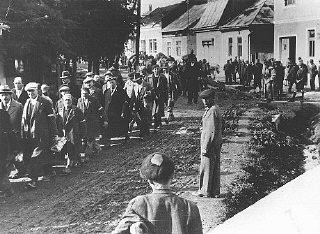No offense, but you are missing an important point: The Peel and Woodhead partition plans were before World War II but they were after the Nazis came to power. Jewish migration to Palestine actually stagnated in the 20s.
Also, in Hungary, Horthy was not very anti-Semitic, AFAIK.
Jewish migration picked up again in the 30s not only because of the Germans, but because the US shut its doors and the economic situation got bad in Europe.
Horthy was indifferent towards Jews. He protected some Jews to the extent that they were 'his' Jews, but he wasn't going out of his way to protect the Jews of Hungary. He handed over ~20,000 Jews who did not have Hungarian citizenship to the Germans early in the war, which seems to have been the same position Bulgaria and Vichy France took initially. The Holocaust Museum webpage mentions Horthy handed over the Jews of Hungary in 1944, but doesn't mention that the country was militarily occupied by the Germans two months prior. One could argue that much of what he did was to placate the Germans and/or at the barrel of a gun, rather than purely of his own volition, but that's also a world away from saying he saved Jews or went out of his way to protect Jews.
Lots of antisemitism was less outright and intentional malice and more 'these people count less, and I will pin my problems on them or sell them out first' which, from the perspective of a Jewish person getting attacked or targeted, is a difference which provides little comfort. The Hungarian regime was more willing to drag its feet on German demands when it saw the Germans were losing, but gave the Germans what they wanted when it seemed like the Germans were winning and/or when the Germans straight-up occupied Hungary in 1944.
If anything - this was the ultimate point of Zionism. There were lots of countries where Jews lived nice lives, but unless the Jews had their own country where they could put themselves first, they would eternally be the first on the chopping block when things turned south. That all of the supposedly liberal countries of Europe which accepted Jews as citizens (France, Germany, Hungary, etc.) had turned on the Jews so readily only amplified this point.
Honestly - and this will be the most controversial thing I say in this thread - the Hungarians dragged their feet more than, say, the German public or the French did. None of this should be read as defending the Hungarians (I am not), nor should this be read as signing onto the Jobbik/Fidesz partisan line regarding Hungary in WW2 (I am not). "Everybody else was doing it" is not a moral defense; but at a certain point to me it's just the latest manifestation of a millenium of non-Jewish treatment of Jews, it makes me very mad, but every evil act needs to be contextualized. The reason we celebrate great people who put their necks and lives on the line in the face of evil is because of how utterly weird and uncommon that is. Human beings can be very civil when they are comfortable and tend to fold quickly in the face of evil ... which is why those few who have the resolve to assume great risk for the cause of the betterment of mankind and the historically downtrodden truly are great people.
They are righteous among the nations. Horthy was not this. He certainly wasn't the Nazis, the Ustace, or the Iron Guard, but he was in no way a great man either.
*******************************
From Wikipedia





